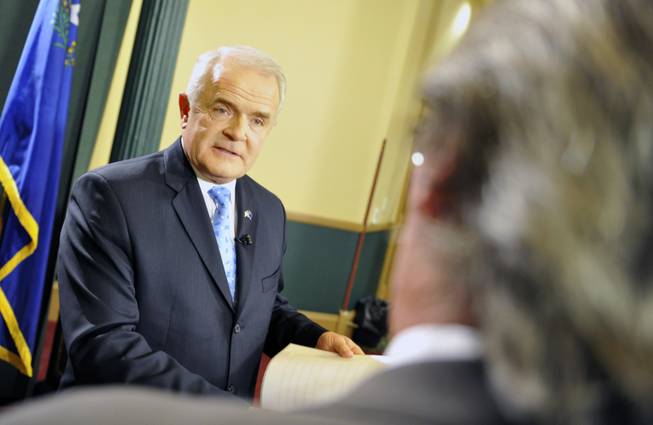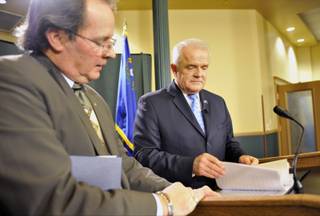
AP Photo/Scott Sady
Gov. Jim Gibbons discusses his speech with Dan Burns, his communications director, as the governor prepares to give his State of the State speech upstairs in the Capitol building in Carson City on Monday, Feb., 8, 2010.
Tuesday, Feb. 9, 2010 | 2 a.m.
Reader poll
State of the State
Gov. Jim Gibbons gave an emergency State of the State address at 6 p.m. Monday, Feb. 8. Video is courtesy KVBC Channel 3.
Sun Archives
- Governor plans emergency address on Nevada budget (2-7-10)
- Governor’s speech will lay out state’s budget problems (2-7-10)
- State budget comes up $800 million short (1-22-10)
- Forecast: Economy will begin to rebound in mid-2011 (1-22-10)
- Gibbons’ no-talk order further divides branches (1-22-10)
- Special session may require help of state Supreme Court (1-10-10)
Sun Coverage
The lesson of the night was that no matter who’s talking, the message is motivated by politics.
In a State of the State address that sounded more like a rallying cry for conservatives to re-elect him, Gov. Jim Gibbons on Monday burnished his credentials as a slasher of government, holding the line on taxes against the forces of bureaucrats, politicians and unions.
And in his party’s response, Senate Majority Leader Steven Horsford called for changes in the state’s tax structure after the economy improves.
By night’s end, nothing new was gleaned about the state of Nevada and the two men’s differing visions for its future.
For his part, Gibbons hit the highlights that will play to a Republican base. He landed punches on the Legislature, decried that “unions dictate Nevada’s education policy,” complained about the lack of help from Washington, and mocked the notion of raising taxes. “Even with $1 billion in new taxes, the state budget is now nearly $1 billion short. You tell me, did raising taxes work?”
He quoted from Ronald Reagan, about how government programs never go away willingly. He said “we much accept that limiting government means expanding personal responsibility ... I will ask our citizens to accept less from government and to take more personal responsibility.”
He attacked state spending, even if studies show Nevada spends the least nationally, as measured as a part of the economy, or funds education at among the lowest levels per pupil in the country.
“Nevada,” he said, “can no longer pay for the bloated government services, which were funded when Nevada’s economy was booming.”
On education, he said, “It’s time to stop whining that education in Nevada doesn’t work because of a lack of funding. We need to quit throwing money at programs that haven’t worked and don’t work for our children.”
Meeting reporters after his speech, Gibbons denied he said state government was bloated, and then said he had been referring to previous budgets.
Gibbons’ staff last week released proposed cuts that included 10 percent reductions in school districts and higher education. In total, the cuts he submitted would equal $418 million. Still, that’s not even half of the $881 million needed to balance the state budget.
Pundits were hardly surprised that Gibbons, suffering from poor poll numbers and with an empty campaign chest to stage a comeback, would deliver a politically stoked message.
“The governor’s speech came off as more of a candidate’s speech,” said Fred Lokken, a professor of political science at Truckee Meadows Community College. “Overwhelmingly, it was a Republican attempt to define the problems facing us and appeal to the Republican ideology.”
“This was a campaign speech, more than a State of the State,” said Eric Herzik, a political science professor at UNR. “It was heavy on slogans and symbols to appeal to his base.”
Even as lawmakers have agreed to not raise taxes and to work together to solve the budget crisis, Gibbons took swipes at the Legislature, which is controlled by Democrats.
“The balanced budget I submitted imposed no new taxes and allowed no expansion of state government. The Nevada Legislature disregarded my solution. They raised taxes $1 billion, and they made government bigger. They made the wrong call.” In his remarks after the governor’s speech, Horsford, a Democrat, agreed that taxes were off the table in the short term, but said the Legislature must enact a “fair, broad-based and equitable” tax structure when the economy recovers.
“We must invest in economic growth and expansion,” Horsford said. “And we must learn from the mistakes of the past so that we never return to this period of time where we are forced to choose between meeting our basic obligations and investing in our future.”
Horsford said that rather than considering tax increases, the state’s tax structure should be analyzed and changed to make it more stable and fair.
After the speech, Horsford said Gibbons “seemed more focused on promoting issues to his base, than leading as governor.” Despite the shots from the governor, Horsford said he was willing to work with the executive branch — or its staff at least. “The governor came to one meeting, for 5 minutes last week. I’m not sure how engaged or not engaged he is.”
Herzik didn’t have any laurels for Horsford’s legislative response, either. “Everything was put off to the future. We need to change the tax structure, but not now. We need to make cuts, but not the ones the governor is making,” he said. “After listening to Horsford’s and Gibbons’ speeches, the one thing that you’ve learned is that an election is coming up.”


Join the Discussion:
Check this out for a full explanation of our conversion to the LiveFyre commenting system and instructions on how to sign up for an account.
Full comments policy